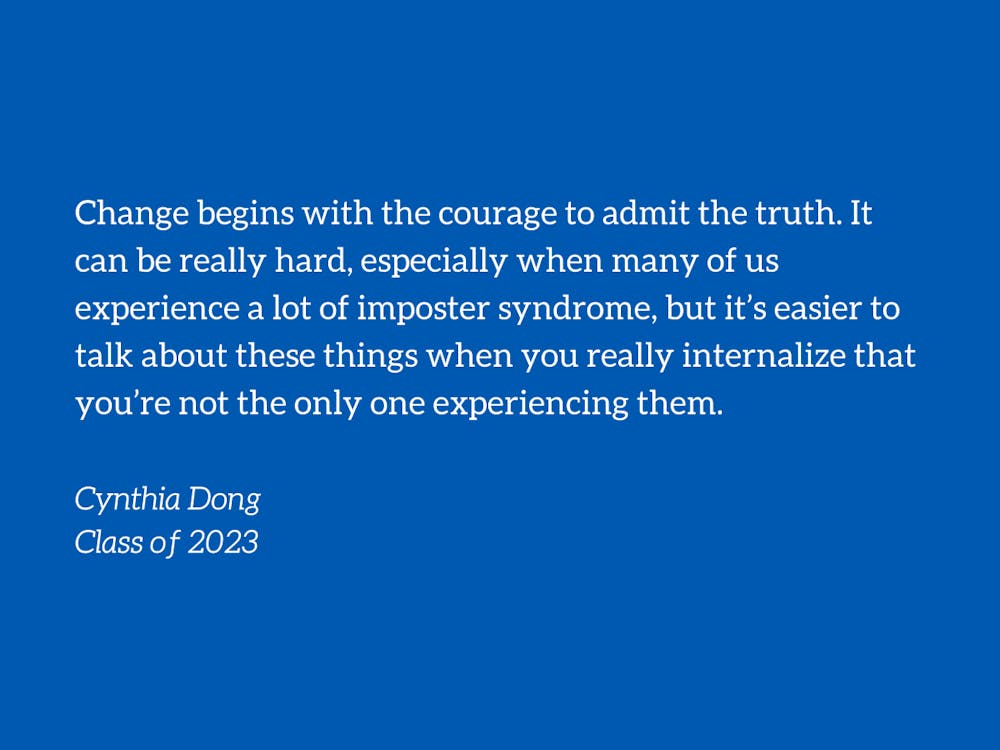At Duke, it’s not uncommon to hear someone grumbling about how much work they have to do, and yet, the most common answer to the question, “How are you?” is still “Fine”, or even “Good!” When it comes down to it, we have trouble being direct with each other and ourselves about our mental health. Why is it so hard for us to admit that we’re not really okay? Why is it so hard to talk about failure, rejection, and struggle when it happens all the time at Duke?
Personally, I think it all stems from the insane amount of pressure Duke puts on its students to appear successful in every aspect of life, this “effortless perfection” that’s mentioned often. If you’re not pulling a 4.5 GPA and partying from Wednesday to Sunday, what are you doing with your life? If you don’t have 3 internships lined up and your 10-year career plan ready, who even are you? Obviously, this is an exaggeration, but it genuinely feels that way sometimes. It feels like no matter what you’re doing, it’s never enough. What makes this worse is the reality that we can’t expect everyone to be kind and understanding. It always seems like there’s a tiger in the room when you’re a student at Duke.
So, you don’t really want to admit things might not be okay. This is problematic because if you don’t want to admit you need help, you likely won’t try to look for it. On top of that, because you don’t hear other people talking about it, you might feel like you’re the only one who can’t pull yourself together. Then, you start spiraling. “What if I just can’t do this? What if I’m going to fail out of Duke? It’s all just too much. It’s just too much to handle. I feel like I can’t do this anymore. Maybe I should just quit everything.”
Does any of this sound familiar yet?
Mental Health Awareness Week is a project that seeks to address those issues. Duke’s Student Wellness Center has collaborated with DSG and other student groups on campus to create an intentional effort to show Duke students that “You Are Not Alone” and that the resources to support you during your spirals are here. The week features a week-long social media campaign where DSG’s instagram page will be posting about relevant mental health issues and coping strategies. There’s also a long list of events being offered to spread awareness about mental health, including the 2nd Annual Mental Health Forum and panels hosted by Mi Gente and Diya.
It’s also important for us to take accountability for the culture surrounding mental health. Change begins with the courage to admit the truth. It can be really hard, especially when many of us experience a lot of imposter syndrome, but it’s easier to talk about these things when you really internalize that you’re not the only one experiencing them. Most of us have been rejected from at least one of Duke’s “premier” social or pre-professional organizations. Even more of us have scraped up rejections for programs in the double-digits. On top of that, I think you’d be hard-pressed to find a Duke student who hasn’t considered a complete career change at least once.
For me, the time in my life that exemplifies this “floating duck syndrome” was my first semester at Duke. It was easily one of the most stressful periods of my entire life. There were days I threw up because of how anxious I was. There were days where I couldn’t go to classes because my chest felt so heavy that I couldn’t get out of bed. I felt like I would never be successful at Duke. On top of that, I didn’t have solid friends yet. We were all still trying to figure out who our friends were, where we belonged, and what we wanted out of life. But when I was going through all of that, most people didn’t see any of it. They only saw what I showed them: a girl who was doing fine in school, a girl who liked to talk to everyone, a girl who was always smiling. Most of the people had no idea that there were days where I felt like my life was pointless and that I was a complete failure. That’s why it’s so important for us to share our stories; otherwise, we’ll all just feel like we’re the only one on our island of misery. There’s power in community and bonding through shared experiences. It’s not easy to talk about, but then again, when does anything of worth come easily?
Another thing I want to emphasize is that mental health awareness shouldn’t end with this week. Every week should be a week dedicated to your mental wellbeing. While some might scoff at the utility of “deep breathing” or therapy, the evidence overwhelmingly concludes wellness techniques really work in alleviating stress, anxiety, and depression. Therapy in particular has the ability to address a wide variety of mental illnesses, including PTSD and OCD. And while medication can be a controversial topic with mental health, it has improved the lives of countless people. I know that without Celexa, my trusty antidepressant, daily functioning becomes very hard for me.
Just remember, no matter how it might seem, you are never alone. Struggling with your mental health does not mean you will be unhappy forever. There are resources here to help you and so many people rooting for you (I know I am!). All you need to do is take the first step and reach out.
Cynthia Dong is a Trinity Sophomore. She is a DSG Senator and Co-Leader for the Mental Health Awareness Week project.
Get The Chronicle straight to your inbox
Signup for our weekly newsletter. Cancel at any time.

